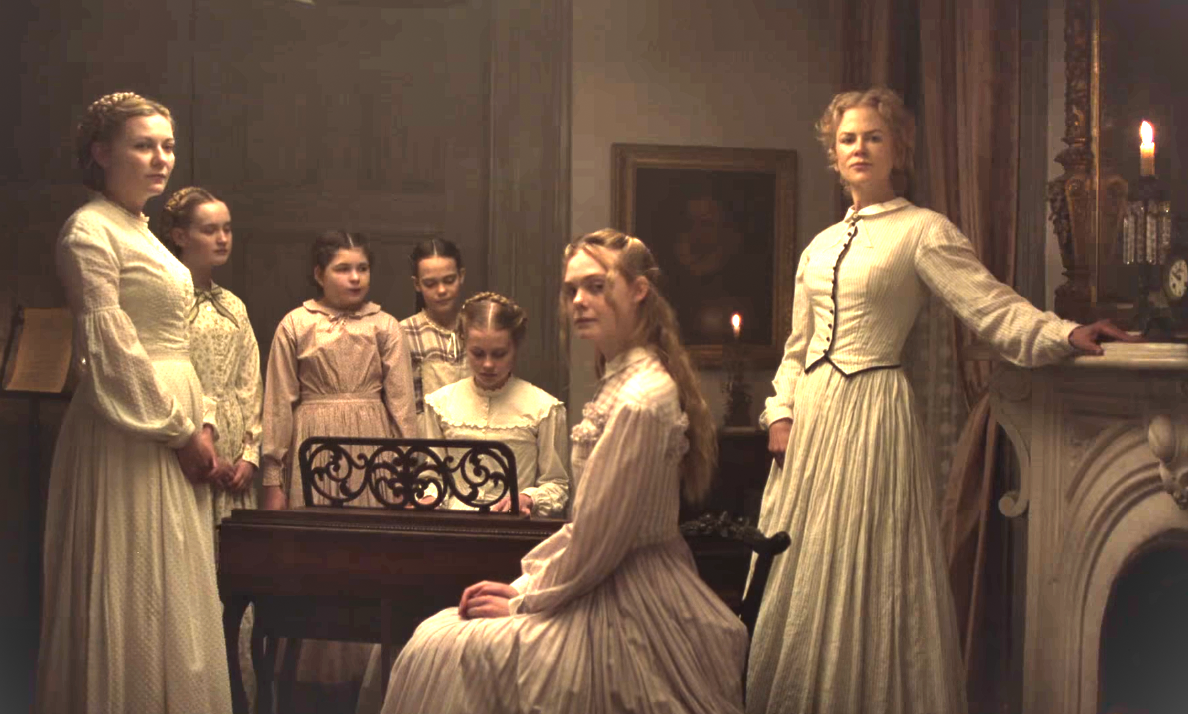In A Ghost Story, Casey Affleck plays a man who dies in a car accident, and spends the rest of the movie a ghost, donning the stock white bed sheet with two eyeholes cut into it, like one of the trick-or-treaters from It's the Great Pumpkin, Charlie Brown. Much of the film involves Affleck's character, besheeted, standing inside his old house, watching his former wife, played by Rooney Mara, as she navigates her unexpected new life as a young widow. The film was written and directed by David Lowery, and its simple and austere plot and filmmaking may be a direct reaction against the big-budget Pete's Dragon, which Lowery was also working on at the time. But there's nothing in A Ghost Story to hold our attention. The film ponders life's big questions in an obvious and dull way, and much of it is simply static. We're left to fill in long scenes of people standing, staring, saying nothing, doing nothing, with our own thoughts and feelings. I like a film that gives me space to enter its world and think about it, but the world of A Ghost Story is drab and listless, and the longer the movie went on, the more I began to itch for something dramatic and over-the-top: Give me an overacted Tennessee Williams adaptation over this dismal stuff any day of the week. The film reaches some kind of philosophical head at a party scene, near the end, after even Casey Affleck's ghost has somewhat faded into the background. A guest at the party delivers a long speech about the meaningless of life. The movie's explorations of these questions, however admirable and bold, is not very interesting. Perhaps we're meant to experience some kind of catharsis from A Ghost Story, or to experience it as cinematic poetry. If it is a cinematic poem, it's from the Mary Oliver school of poetry, brimming with self-congratulatory observations that are militantly simple and "earthy."
December 10, 2017
The Beguiled
"Bring me the anatomy book" has to be the greatest line from a movie in 2017. It comes from Sofia Coppola's The Beguiled (and I have no idea if it's originally from the novel, or the first film adaptation of this material, from 1971), and uttered with cold precision by Nicole Kidman's character, who's about to execute her very first amputation. The film is set at a girls' school in Virginia, during the seemingly endless slog of the Civil War. Several of the girls have remained at the school, under the care of its very proper headmistress (Kidman) and the one remaining teacher (Kirsten Dunst). This is essentially a finishing school, where girls learned how to be young ladies. While they do make time for academics, the real teaching that goes on is about the domestic sphere, a woman's primary place of influence and identity during this period. The film explores the ways in which the unexpected arrival of a man (a wounded Union soldier played by Colin Farrell) upsets the very carefully constructed world of these women and girls, and how their own desires come into direct conflict with the lessons they're trying to teach (or learn). The Beguiled is fueled by a subtle, unflinching irony, which may be the reason I felt a degree of cold admiration for the film, rather than genuine pleasure. It's impeccably made (Sofia Coppola continues to prove herself a truly talented and original filmmaker) and acted. The ways that Kidman and Dunst exert control over each other, and over Farrell's character (a man whose moral compass we're never quite sure about), is its own kind of mesmerizing puzzle, and these actors bring out the intricacies of sexual desire and sexual politics in the very repressed 19th century. (Farrell flirts with both of the women, and several of the students; his affection creates a tension between all of them, who have suddenly realized a desire they didn't know they had.) But The Beguiled didn't affect me on a visceral level, which may have been what I was expecting from it, and so the movie left me somewhat unmoved, despite all of its many fine elements.
Alien: Covenant
Alien: Covenant would probably be considered a better movie if it weren't part of the Alien series, if it were not being judged against insurmountable odds: being worthy of the original Alien (1979), the masterpiece of this franchise, or even the 1986 sequel, Aliens, which is junky yet consistently entertaining. Judged on its own merit, Alien: Covenant (the first Alien sequel to be helmed by Ridley Scott, who directed the original) is passable science fiction. This time around, the crew of a spaceship, bound for some outlying planet, is awakened after a malfunction kills 47 embryos. (Their ship is carrying over 1000 human embryos which will be harvested to populate this earth-like planet, a new colony.) When the crew receives unknown transmissions from another planet in their path (one that also may be habitable), they decide to investigate. We as the audience know exactly what's going on: This is a ruse to get them into harm's way. The movie unfolds rather predictably after that, as various crew members wander into dangerous situations and are picked off in ghastly ways by the alien creatures. Michael Fassbender, reprising his role as an android from Prometheus (the 2012 Alien prequel), figures prominently here; he's as cold and inhuman as you would expect an android to be, and he figures into a rather ingenious plot twist. And even though the ending is bold for a big budget thriller, ultimately, one grows weary of Alien: Covenant, and of its the idiotic characters, very quickly.
With Katherine Waterston, Danny McBride, Carmen Ejogo, and Billy Crudup.
With Katherine Waterston, Danny McBride, Carmen Ejogo, and Billy Crudup.
Subscribe to:
Posts (Atom)


